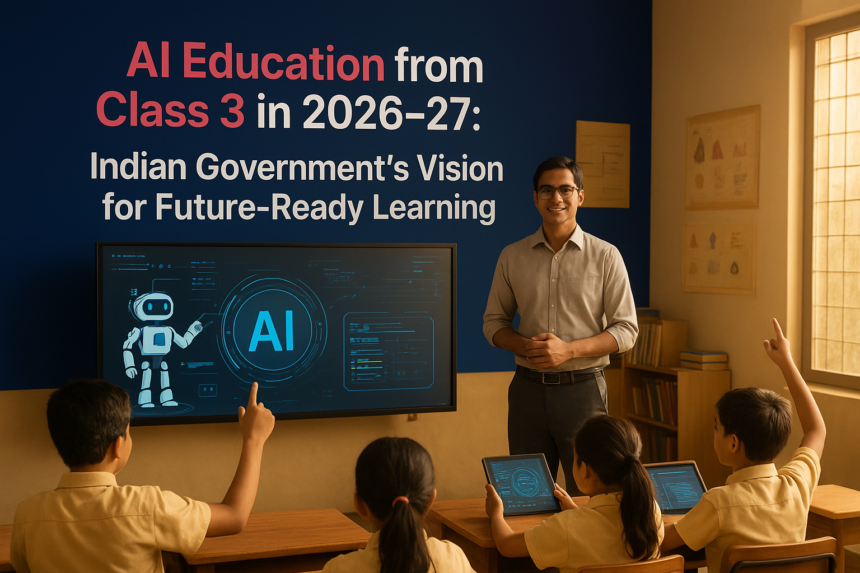In October 2025, the Indian Government officially announced that Artificial Intelligence (AI) education will be introduced from Class 3 starting in the academic year 2026–27.
This groundbreaking initiative by the Ministry of Education aims to prepare young students for a technology-driven world and nurture early digital literacy.
A Step Toward Future-Ready Learning
The announcement highlights India’s growing commitment to integrating emerging technologies into its school curriculum. By introducing AI at the primary level, the government envisions creating a generation of critical thinkers, problem solvers, and innovators.
AI will no longer be a distant concept taught only at higher levels — it will become a part of the foundational learning structure for children as young as 8 or 9 years old.
What Students Will Learn
The AI curriculum, designed to be age-appropriate and interactive, will help students understand the basics of technology and digital thinking in a fun and engaging way.
For Classes 3–5:
- Understanding what Artificial Intelligence means
- Real-life examples of AI (voice assistants, image recognition, etc.)
- Learning through stories, games, and interactive classroom sessions
- Encouraging curiosity, creativity, and logical thinking
For Higher Classes:
- Basics of machine learning and robotics
- Coding and algorithmic thinking
- Responsible and ethical use of AI
- Hands-on AI experiments and projects
This structured approach ensures that students grasp both the potential and the responsibility that comes with AI.
Why the Move Matters
The world is rapidly evolving with AI shaping industries like healthcare, education, finance, and transportation. Introducing AI education early helps build awareness and capability among young learners.
Key benefits of early AI education include:
- Strengthening digital literacy and STEM skills
- Encouraging innovation and creativity
- Promoting ethical use of technology
- Preparing students for AI-driven careers in the future
Experts say this step will bridge the digital divide and enable every child, regardless of location or background, to understand and use technology meaningfully.
Coimbatore’s Educational Advantage
Known for its progressive educational culture, Coimbatore is already gearing up for this transformation.
Many reputed schools in the city have introduced coding labs, robotics workshops, and AI learning modules ahead of the 2026 rollout.
With tech-based education gaining momentum, Coimbatore’s schools are well-positioned to integrate AI seamlessly into their teaching methods.
Parents and educators alike believe this initiative will enhance students’ confidence and expand career opportunities in the long run.
Teachers and Infrastructure: The Backbone of AI Learning
To make this large-scale reform effective, the Ministry of Education is focusing on:
- Teacher training programs to help educators understand AI concepts
- Smart classroom setups equipped with AI-based learning tools
- Collaboration with ed-tech platforms for hands-on student learning experiences
This multi-level approach ensures that both teachers and students are ready to embrace a digitally inclusive education system.
In Line with NEP 2020
The decision to start AI education from Class 3 aligns perfectly with the National Education Policy (NEP) 2020, which emphasizes technology-driven and skill-based learning.
By weaving AI into early education, the government is fostering an environment that encourages innovation, interdisciplinary learning, and practical application — all key goals of NEP 2020.
A Visionary Move for India’s Digital Future
This October 2025 announcement marks a historic moment for India’s education sector.
By starting AI education at the foundational level, India joins a global movement to prepare young minds for the Artificial Intelligence revolution.
The initiative not only enhances learning outcomes but also aims to make India a hub for future tech talent — empowering children to lead in tomorrow’s digital economy.




